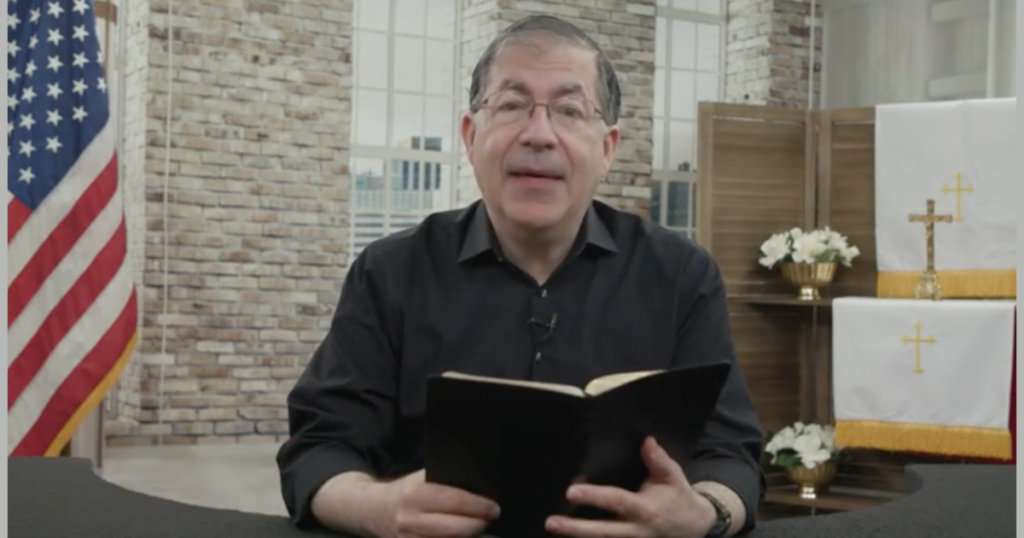Guest Post by Pro-life Leader Frank Pavone, National Director, Priests for Life
Fr. Frank Pavone
National Director, Priests for Life
August 12, 2024
Your Eminences/Excellencies,
Since 1994, the Priests for Life ministry team, which I continue to lead and which embodies a wide range of pastoral and political experience, has addressed our national elections, seeking to articulate and apply the teachings of the Church to the political realm.
We affirm the Second Vatican Council’s teaching in Gaudium et Spes, which states, “Christ, to be sure, gave His Church no proper mission in the political, economic or social order. The purpose which He set before her is a religious one” (42). Yet, as you well know, that statement provides the context for a vigorous exposition of the Church’s responsibilities to shape temporal realities in accordance with the Kingdom of God.
In articulating those responsibilities, that same document of the Council goes on to state, “At all times and in all places, the Church should have the true freedom to teach the faith, to proclaim its teaching about society, to carry out its task among men without hindrance and to pass moral judgments even in matters relating to politics, whenever the fundamental rights of man or the salvation of souls requires it” (76; see also Compendium of the Social Doctrine of the Church, 426; Catechism of the Catholic Church, 2246; “Doctrinal Note On some questions regarding the participation of Catholics in political life,” CDF, November 24, 2002, and Code of Canon Law 747 §2).
In a book I wrote in 2015 (Abolishing Abortion, Thomas Nelson publishing), I document extensively the manner in which that duty of the faithful, both clerical and lay, to “pass moral judgments even in matters relating to politics,” has been hindered by the kind of guidance that dioceses, Catholic Conferences and the USCCB routinely issue. When, as expressed in many of the diocesan memos I quote, Catholic Churches and other institutions are told not to “engage in any political activity which seeks to support or discredit any political party or candidate” (p.117) one wonders how the moral judgment in matters relating to politics is to be expressed.
In America’s elections this year, we are not dealing with normal “political disagreements.” If what divided the political parties were matters merely of prudential judgment, or policy disagreements that should be worked out by open debate, trial and error, and the corrective processes provided by our legislative, executive, and judicial mechanisms, then the official neutrality of the Church could be easily understood and implemented.
But that is not where we are right now.
We do not have a division simply on policy, but on principle. Our political divide is not simply about prudential judgments, but about ‘the fundamental rights of man’ and ‘the salvation of souls’ referred to by the Second Vatican Council, the Catechism, and numerous other sources.
The Democrat Party, its current Administration, and its leading candidates, embrace and promote unrestricted abortion both on the federal and state level. How, then, is it possible for the Church “to proclaim its teaching” without discrediting (implicitly if not explicitly) the political party that so obviously opposes that teaching? As you well know, St. John Paul II called governments that legalize abortion “a tyrant state” (EV, 20). That’s pretty discrediting.
How, furthermore, can the Church defend her own religious freedom, the nature of marriage and the family, the rights of parents over their children, the duty of nations to protect their citizens at the border and in their city streets, the rights of voters to free and fair elections, and the rights of children to be safe from transgender indoctrination and mutilation, without discrediting the Democrat Party, which is engaged in an obvious assault on all these rights?
In writing to you about this, I express the concerns not only of Catholics, but of our brothers and sisters in other Christian denominations who are strong allies in the fight for life, family and freedom. Unfortunately, while they have courageously defended the freedom of churches to preach the Gospel and “to pass moral judgments even in matters relating to politics,” they have found much of the response from Catholic religious leaders to be disheartening.
Each year, on August 14th, the Catholic Church honors St. Maximilian Kolbe, the Polish priest who, in the Auschwitz death camp, sacrificed his life for another prisoner. However, the part of that inspiring story that is less well known, and less preached, is that he had published pamphlets from his monastery against the Nazi party because of their positions against human dignity and religious freedom.
Moreover, in 2005 the Church beatified Cardinal Clemens von Galen, who became known for his sermons against that same Nazi party and their positions against human life and the freedom of the Church. In his homily at the beatification, Cardinal Martins said,
“In [his homilies, Cardinal von Galen] targeted the obligatory closure of convents and the arrest of Religious. He spoke vigorously against the deportation and destruction of those human lives that the regime deemed unworthy to be lived, that is, the mentally disabled. The Bishop’s fiery words dealt fatal blows to the Nazi’s systematic extermination policy.
“His clear arguments infuriated the Nazi leaders who were at a loss as to what to do next, because they did not have the nerve to arrest or kill him due to Bishop von Galen’s extraordinary authority.
“It was neither innate courage nor excessive temerity. Only a deep sense of responsibility and a clear vision of what was right and what was wrong could have induced Bishop Clemens August to speak these words. They invite us to reflect on the brilliance of his witness to faith; in times that may seem less threatening but are just as problematic with regard to human life, they invite us to imitate his example.”
Never has the voice of the Church been more needed; everything we stand for and have fought for is on the line. Yet clergy and laity alike, when they strive to imitate the example of Kolbe and von Galen, receive pushback from Church leaders. They are criticized rather than encouraged, and canceled rather than supported.
Be assured, the voice of the Church will be heard, because as you know and as you teach, the Church is more than the hierarchy. We know what is right, we know what the Church teaches, and we know how to win elections. We just would rather not feel like we’re fighting without our leaders or, worse, having our leaders fight against us.
Increasingly, too many leaders appear to be both naive and cowardly in the face of the intense cultural and political battle that rages – a battle which more and more believers correctly see as a conflict between good and evil, between commonsense and insanity.
This election is not business as usual, and therefore I have written to you publicly. Many of the faithful, and I, respectfully hope for leadership from you that is likewise more than business as usual.
Sincerely,
Frank Pavone
National Director, Priests for Life
The post Frank Pavone: An Open Letter to the United States Catholic Hierarchy appeared first on The Gateway Pundit.







